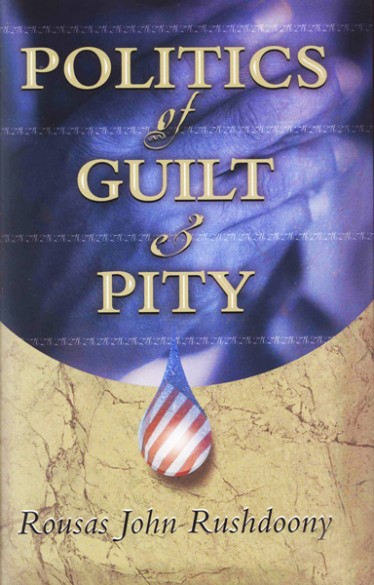
Originally published in the 1970s, the Politics of Guilt and Pity by R.J. Rushdoony is a must-read for any Christian today. Rushdoony eloquently addresses some of the major errors of our day from a solidly biblical worldview. Topics addressed include the cultural Marxism of tolerance and multiculturalism, the main means by which they are advanced, the misuse of guilt and pity, and the control of money. The book was reprinted in 1995 and is available from Empty Tomb Books for the low price of $16. Below are some selected quotes from the book:
“The reality of man apart from Christ is guilt and masochism. And guilt and masochism involve the unshakeable inner slavery which governs the total life of the non-Christian. The politics of the anti-Christian will thus inescapably be the politics of guilt. In the politics of guilt, man is perpetually drained of his social energy and cultural activity by his over-riding sense of guilt and his masochistic activity. He will progressively demand of the state a redemptive role. What he cannot do personally, i.e., to save himself, he demands that the state do for him, so that the state, as man enlarged, becomes the human savior of man. The politics of guilt, therefore, is not directed, as the Christian politics of liberty, to the creation of godly justice and order, but to the creation of a redeeming order, a saving state. Guilt must be projected, therefore, on all those who oppose this new order and new age.” (page 9)
“[G]odly man must recognize that he has the obligation to be without pity and without charity in dealing with some, that this attitude, however harsh it may seem in terms of modern sentimentality, constitutes moral strength and spiritual integrity. He must recognize that he cannot rob himself or others in order to feed the undeserving of the world, or the improvident who demand as their right a portion of our wealth. . . . [T]rue stewardship means a humility whereby man avoids a fundamental sin common to false charity, that of trying to be God.” (page 72)
“Religious relativism is the ground of political absolutism. The conception and demand for an absolute just order is strongest where men are most insistent that Christianity’s absolutes are without reality.” (page 126)
“Man needs a source of certainty and an agency of control: if he denies this function to God, he will ascribe it to man and to a man-made order. This order will, like God, be man’s source of salvation: it will be a saving order.” (page 185)
“If the state controls money and banking, it can levy an income tax and every kind of tax without any special apparatus. The state then has total economic power. By its manufacture of paper money, the state has the power to confiscate all wealth and nullify whatever wages it pays to the workers. Hard money is resistant to socialism: it provides the owners with independence.” (page 227)
“We must render honor and justice to all men wherever due, but we have a particular responsibility to care for our own. This means first of all our families. . . . Biblical conduct is regulated by relationship, and to subvert this is to lead directly into welfare economics and socialism. If a man must exercise towards all men the same care, oversight, and charity he does towards his own family, then an impossible burden is placed on him. . . . Every system of ‘universal’ ethics is at one and the same time a system of universal slavery.” (page 248)
“In terms of the Kingdom of God, the offices of priest and king are united in the person of Christ. Since the basic unity of the Kingdom is supernatural and messianic, the purpose of biblical history was thus to point to the ultimate and transcendental unity, while preventing an immanent and man-centered unity. Such an earthly unity of the two offices would transform the realm into the Kingdom of Man and make it a messianic order.” (page 293)
“The foundation of orthodox Christian political theory is the divine decree and the authority of the infallible Scripture. The foundation of classical, liberal political thought is natural law and the authority of the autonomous reason of man. The foundation of post-Darwinian liberalism is the necessity of statist law as the new predestination and decree and the authority of the scientific socialist elite of the state. Liberty under God was the concept of the Christian state; liberty under Nature was the thesis of classical liberalism, liberty under the state is the assumption of the scientific socialist state.” (pages 315-316)
| Tweet |
|
|
|




